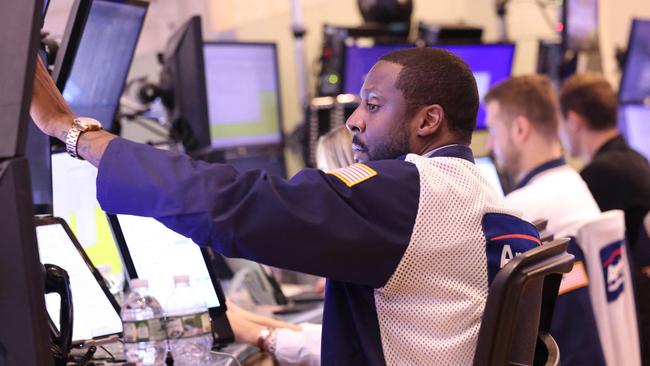Inflation expected to rebound but how will the RBA react?
As Australia’s corporate reporting season gets under way, UBS says further gains in the local sharemarket won’t be easy.

As Australia’s corporate reporting season gets under way, UBS says further gains in the local sharemarket won’t be easy.
However, profit margins should be OK and investors are looking forward to an earnings rebound, particularly for US-facing companies where growth looks more resilient.
Of course from a top-down point of view the big question for the Australian market on Wednesday is whether the June quarter inflation data is low enough to prevent a potentially damaging late-cycle interest rate rise by the Reserve Bank in the coming months.
Most of the half-dozen economists who predict a restart of rate rises in Australia next month have forecast core “trimmed mean” inflation in line with the consensus estimates of 1 per cent on-quarter and 4 per cent on-year.
Anything higher would potentially spark a short-term negative reaction from stocks and bonds.
But many investors will sense that the RBA won’t actually pull the trigger on another rate rise at this stage of the economic cycles unless inflation is shockingly high. That probably means outcomes above the top of the range forecasts, which is 0.8-1.1 per cent for the quarter.
On that basis investors would probably “buy the dip” soon after slightly higher inflation outcomes, even though there will no doubt be some lingering anxiety before the RBA’s decision next Tuesday.
Perhaps the RBA board will round off the cash rate target by lifting to 4.5 per cent rather than do a full 25 basis points, adding an appropriately smaller amount of policy restriction while also providing a lot of hope that the bank board has finished lifting rates.
Another thing to consider is that the Federal Open Market Committee is due to release its policy statement early Thursday morning AEST.
The FOMC is expected to set markets up for a rate cut by changing the wording of its statement to show that it has made substantial progress to its goal of lowering inflation to its 2 per cent target.
Earnings reports from US mega-cap tech stocks including Microsoft, Meta, Amazon and Apple, together with US economic data including the employment cost index, ISM manufacturing and non-farm payrolls will be closely watched in the coming days.
But if the FOMC signals that US rate increases are on the way and no recession is in sight,

Australian shares and bond could be helped along by further gains in the US market.
While on the FOMC, some now expect a clearer signal of impending rate cuts from Federal Reserve chairman Jerome Powell’s speech at the Jackson Hole Central Bankers Symposium on August 24.
After upgrading his calendar year end target for the ASX 200 in April, UBS Australia equity strategist Richard Schellbach kept that target unchanged at 8000 points in mid-July as the index soared through that level, hitting a record high of 8083.7 points. At that time he noted that while cash and bond yields had risen across the past four years, they didn’t offer the attractive pull they once had against stocks, and that compared with global equities, the valuation of the local market was roughly in the range it had been in for the past 20 years.
From a cyclically adjusted PE, or CAPE, point of view, he saw “no sign of an earnings bubble”.
In an update on Tuesday, Mr Schellbach said further broadbased gains in the local market wouldn’t be easy given the median stock in the ASX 200 still sat well elevated from long-run valuations norms.
But profit margins were expected to stabilise at mid-cycle levels even as earnings were expected to fall for a second financial year after abnormally high profits during the Covid-19 pandemic.
“This ‘sugar rush’ period has now passed and analysts expect that ASX 200 companies will see their financial 2024 earnings contract by 3.5 per cent versus financial 2023, marking a second consecutive year of negative EPS growth for the index following last year’s 2.9 per cent,” Mr Schellbach said.
“Margins will be keenly followed through results, and we remain of the belief that they can stabilise at mid-cycle levels – yes company selling prices have been decelerating over the last 12-months, but so have their purchase costs.”
Earnings for banks, consumer staples and retailers were “coming down off last year’s earnings peak”, while resources – especially energy – looked set to form an earnings floor after a “profits high point” in financial 2022.
Moreover, with earnings growth from banks and miners expected to be on the backfoot, earnings leadership “won’t come from the usual suspects” this profits season.
But Mr Schellbach saw another strong showing from insurers as they continued to impress on improved profitability and standout pricing power, and a warming domestic capex cycle should shine favourably on certain industrial stocks.
US-facing businesses should experience solid top-line growth from continued US economic strength and an added earnings boost from the weak Aussie dollar.
Schellbach also noted an “unusual number of ‘stale’ earnings numbers” again this earnings season due to a lack of guidance from many companies in the wake of the pandemic.
Combined with “investor crowding”, this could lead to outsized moves on result days.
Rio Tinto was due to report its half-year results at 8.30am AEST on Wednesday.




To join the conversation, please log in. Don't have an account? Register
Join the conversation, you are commenting as Logout